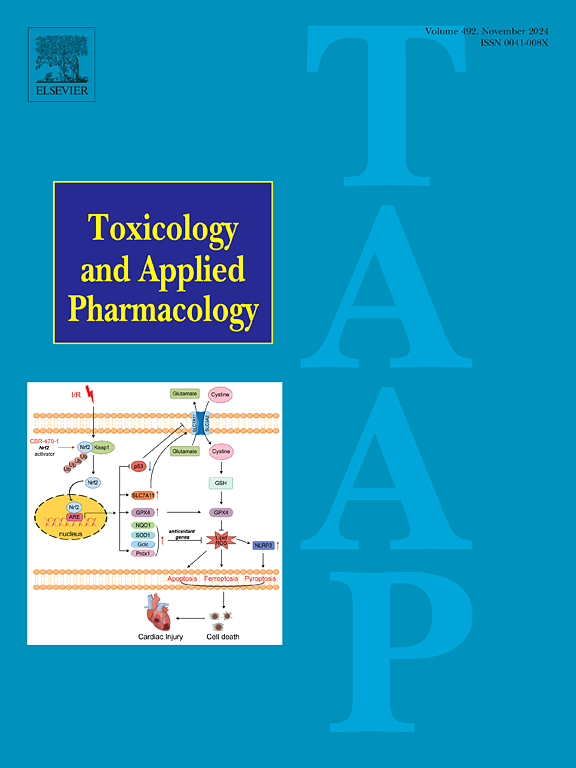Activation of the cGAS-STING pathway in monocytes exacerbates pulmonary fibrosis induced by paraquat poisoning
IF 3.4
3区 医学
Q2 PHARMACOLOGY & PHARMACY
引用次数: 0
Abstract
Paraquat (PQ), a total contact herbicide, triggers progressive pulmonary fibrosis and multiorgan failure. This toxicity occurs via DNA damage-induced mitochondrial dysfunction and dysregulated extracellular matrix (ECM) remodeling, highlighting the urgent need for novel therapeutic strategies. This study systematically investigated monocytic cyclic GMP-AMP synthase (cGAS)-stimulator of interferon genes (STING) signaling in PQ-associated fibrotic lung pathology, focusing on its mechanistic involvement in innate immune regulation. Analysis of the single-cell dataset derived from lung tissue of PQ-poisoned patient revealed significant activation of the TGF-β signaling pathway in fibroblasts and marked hyperactivation of the cGAS-STING pathway in monocytes. Cell co-culture assays confirmed that PQ treatment activated the cGAS-STING pathway in monocytes co-cultured with fibroblasts. Consequently, transforming growth factor-β1 (TGF-β1) expression was upregulated, which stimulated fibroblast activation. The pharmacological cGAS antagonist G150 demonstrated significant attenuation of PQ-triggered cGAS-STING pathway in monocytes and downregulated TGF-β1 expression, thereby preventing fibroblast activation in co-culture systems. Similarly, the mouse-specific cGAS inhibitor RU.521 effectively reduced collagen deposition and fibrosis severity while also improving survival rates in PQ-treated mice. Additionally, RU.521 suppressed pulmonary cGAS activity and reduced levels of downstream cGAS-STING pathway proteins. In conclusion, pharmacological targeting of monocyte-driven cGAS-STING pathway emerges as a promising strategy against PQ-associated fibrotic lung disease.

单核细胞cGAS-STING通路的激活加剧了百草枯中毒引起的肺纤维化。
百草枯(PQ)是一种全接触除草剂,可引发进行性肺纤维化和多器官衰竭。这种毒性是通过DNA损伤诱导的线粒体功能障碍和细胞外基质(ECM)重塑失调而发生的,因此迫切需要新的治疗策略。本研究系统研究了单核细胞环GMP-AMP合成酶(cGAS)-干扰素基因刺激因子(STING)信号在pq相关纤维化肺病理中的作用,重点研究了其参与先天免疫调节的机制。pq中毒患者肺组织单细胞数据分析显示,成纤维细胞中TGF-β信号通路显著激活,单核细胞中cGAS-STING信号通路显著过度激活。细胞共培养实验证实,PQ处理激活了与成纤维细胞共培养的单核细胞的cGAS-STING通路。因此,转化生长因子-β1 (TGF-β1)表达上调,刺激成纤维细胞活化。药理cGAS拮抗剂G150在单核细胞中显著抑制pq触发的cGAS- sting通路,下调TGF-β1的表达,从而阻止共培养系统中成纤维细胞的活化。同样,小鼠特异性cGAS抑制剂RU.521有效地减少了胶原沉积和纤维化严重程度,同时也提高了pq处理小鼠的存活率。此外,RU.521抑制肺cGAS活性,降低下游cGAS- sting途径蛋白水平。总之,单核细胞驱动的cGAS-STING通路的药理学靶向是治疗pq相关纤维化肺疾病的一种有希望的策略。
本文章由计算机程序翻译,如有差异,请以英文原文为准。
求助全文
约1分钟内获得全文
求助全文
来源期刊
CiteScore
6.80
自引率
2.60%
发文量
309
审稿时长
32 days
期刊介绍:
Toxicology and Applied Pharmacology publishes original scientific research of relevance to animals or humans pertaining to the action of chemicals, drugs, or chemically-defined natural products.
Regular articles address mechanistic approaches to physiological, pharmacologic, biochemical, cellular, or molecular understanding of toxicologic/pathologic lesions and to methods used to describe these responses. Safety Science articles address outstanding state-of-the-art preclinical and human translational characterization of drug and chemical safety employing cutting-edge science. Highly significant Regulatory Safety Science articles will also be considered in this category. Papers concerned with alternatives to the use of experimental animals are encouraged.
Short articles report on high impact studies of broad interest to readers of TAAP that would benefit from rapid publication. These articles should contain no more than a combined total of four figures and tables. Authors should include in their cover letter the justification for consideration of their manuscript as a short article.

 求助内容:
求助内容: 应助结果提醒方式:
应助结果提醒方式:


